I woke up early and it's a dull rainy day, so I've been sitting at the computer going through other blogs, etc after a long break.
Jamie Stoke's comments are often fascinating as well as funny, depicting, as they do, a Poland and Britain I've never come across. His comments on National Anthems led me off to check their words for both countries.
Jamie is just joking, of course, but the idea that Brits regularly start up singing their national anthem is one of his surprises. The words he describes seemed very strange as well. Since I couldn't remember how it starts, I checked the wording. Woodlands Junior School in Kent has a summary. I only knew that there was more than a first verse, with no idea what the rest was.
They also have a full version, which has a rather nice verse wishing the whole world was one happy family:
Not in this land alone,
But be God's mercies known,
From shore to shore!
Lord make the nations see,
That men should brothers be,
And form one family,
The wide world over.
I never knew that existed. It may be a bit too Christian for modern Britain, but the sentiment is pretty good for a nationalistic song. Looking at Wikipedia, however, a problem with the anthem is that no one has ever thought it necessary to decide what the right lyrics are. Wikipedia also has a modern (1836) version by William Hickson that seems to have originated the above verse and which generally is somewhat closer to modern ideas. I wonder if that would have been more popular today if it had been accepted into general usage. Interestingly, the Wikipedia authors do not accept The Official Website of the British Monarchy's definitive claim that "The words of the National Anthem ARE as follows:
God save our gracious Queen!
Long live our noble Queen!
God save the Queen!
Send her victorious,
Happy and glorious,
Long to reign over us,
God save the Queen.
Thy choicest gifts in store
On her be pleased to pour,
Long may she reign.
May she defend our laws,
And ever give us cause,
To sing with heart and voice,
God save the Queen.
In any case, in practice, the basic principle is only to play the music for the first verse, with people standing up and singing, moving their mouths randomly or just standing there looking puzzled. (The latter being a world-wide phenomenon: watching to see whether the players sing or not their various national anthems being one of the highlights of international football matches.)
I feel a bit guilty about never having looked up the words of the Polish Anthem, so thank you Jamie for inspiring me to do so. My only excuse is that I thought of it in similar terms to the wording of the English one - Who cares? It's just historic mumbo-jumbo. Wikipedia gives me an English translation:
Poland has not perished yet
So long as we still live
What foreign force has taken from us
We shall take back with the sword.
March, march, Dąbrowski
From Italy to Poland
Under thy command
Let us now rejoin the nation
Cross the Vistula and Warta
And Poles we shall be
We've been shown by Bonaparte
Ways to victory
March, march...
Like Czarniecki to Poznań
After Swedish occupation,
To rescue our homeland
We shall return by sea
March, march...
Father, in tears
Says to his Basia
Just listen, it seems that our people
Are beating the drums
March, march...
Jamie comments on the Polish version from an English perspective, but, personally, I can't get past my routine bemusement at Napoleon's adoration. However, I do wonder to what extent people reading some other country's national anthem assume that it reflects the feelings of the people. I know that I have had the British National Anthem quoted to me as evidence of strong British allegiance to an outdated monarchy, whilst most Brits I have known feel the words are a bit embarrassing, but consider the national anthem to be too trivial to worry about changing. (A bit like the monarchy itself in many cases.) I don't know what Polish people feel about the words of their anthem and make no judgements about the importance of it's details.
On the other hand, it is interesting, once you know the people of the country a bit, to reflect on the way the anthem conversely reflects their more general attitudes. I was asked the other day to name famous World War II British Generals. I could (and can) only think of Montgomery, after which I was given a list of important Polish Generals and their famous victories. It seems a bit more than coincidental that the Polish national anthem and Polish people both set great store by the blood and guts glory of their military heroes, whilst the British and Brits don't. OK, I do know that Wellington's victory at Waterloo against one of history's most bloody dictators, ensured freedom and peace in Europe, but I don't think that balances the numbers (and I probably shouldn't mention it as Norman Davies' Polish wife is reputed to have asked why London has a railway station celebrating a defeat).
You may have figured out that my wife doesn't read these things, as otherwise I'd have hell to pay for that comment: "freedom and peace!". God, Save the Queen! Babcia just told me the Queen is 86 - I wouldn't have known - so he's doing a pretty good job so far. I had to check: the British National Anthem does not claim that God is male.
Monday, 20 June 2011
Subscribe to:
Post Comments (Atom)


No comments:
Post a Comment